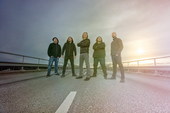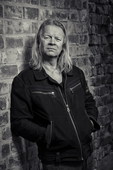Nocturnal Rites
We've Always Been Outsiders
09.08.2018
Архив интервью | Русская версияSweden's Nocturnal Rites surprised the entire power metal community last year - not just by coming back after 10 years of silence, but also by the fact that their comeback record, aptly titled "Phoenix" turned out so good. The band that was on the front edge of the power metal revival in the second half of the 90s, never quite got proper recognition in its time, but chances are very high that they will finally be appreciated as they deserve today. With a new record out, Nocturnal Rites also returned to the touring circuit, performing at major European summer festivals and attracting old and new fans alike. It's at one of such festivals, the Czech Republic's Masters Of Rock, where we got together with bassist and founding Nils Eriksson to discuss various band-related matters. And Nils brought along guitarist Fredrik Mannberg who didn't say that much but was quick to voice his agreement or disagreement.
It’s been almost a year since the release of your latest album “Phoenix”. Are you satisfied with the reception it received? Do you think it succeeded in re-establishing Nocturnal Rites on the metal scene?
Yeah, I think so. We didn't know what to expect, we'd been gone for 10 years, and we didn't know if anyone would remember us or anything. But the second we put out the first song... I remember I was sitting in my summer house, and we released the first song, and instantly we started getting comments from, like, Chile, France, Germany, all over the world. That's the beautiful thing about music this days - it's instantaneous. People from all over the world can listen to music, it's no matter where you are. I remember when we released our first records, people went to a store to buy a record. These days it's so quick. You can reach people all over the world, and that's what I like about these new media of music distribution.
Is it the main thing that has changed over the 10 years that passed since the release of “The 8th Seal”?
I think so. As far as fans and everything are concerned, we have started playing shows, and it's all the same. But the distribution of music is so different. When we went on our small hiatus in 2007-2008, Facebook was not a factor, Spotify wasn't even invented, and YouTube was just starting out. Everything was new back then. Now it's so different. I think it's great to meet people from all over the world, I embrace the new technology, I love it, of course!
I heard than a lot of musicians are not happy with things like Spotify. Do you personally use it?
I use it. I'd rather reach 100,000 fans all over the world in one second than have them go and find CDs. We just have to live in the world we're in.
For the recording of “Phoenix” you brought back together almost the entire previous Nocturnal Rites line-up, except guitarist Nils Norberg. What happened to Nils, why isn’t he playing in any bands anymore?
I guess he got tired. He just wanted to do something else.
How did Per Nilsson (Scar Symmetry, Kaipa) become a member of Nocturnal Rites?
We first met him in 2005 when we did the "Grand Illusion" album. He was hanging out with a couple of friends that did backing vocals for us. Per had been a fan of our band for a long time, he especially liked Jonny (Lindqvist) as a singer. When we started talking about guitar players that we knew, his name was first on our list. We just called him and asked him if he wanted to play guitar for our band. He said, "Let me think about it for a day", and then he called back and said, "Yeah, sure, let's do it". It wasn't really that dramatic.
The last song on the album, “Welcome To The End”, paints a quite apocalyptic picture of the mankind’s future. Do you think that “lining up at the barricades” is the only future possible for the human race?
I think this song is not that dark. It's up to us the people who live in the present times to choose. So obviously it's not the only way.
Do you consider Nocturnal Rites a regular band nowadays? Do you plan to keep it going on a regular basis?
Yeah, we're back, the ball is rolling. It's time to make new music, play more gigs. We just talked in the dressing room about the next record.
Is it difficult to be in an active band when you’re not 25 years old anymore? (everybody laughs) I guess you all have families and a lot of things to do...
It's harder, yeah. I remember back in the day when we started out, it was all about the band, you didn't have anything else to think about. If you had a job, you did it in the day, but when you came home, the band was your main focus. It was number one in your mindset. These days we have a lot more to think about, but, you know, it works!
Is the band a kind of second job for you, or is it more like a vacation from your regular daily activities?
You know what? We've always been in this band because we love making music, making records and playing shows. It's never been about a career, if it's not fun, we wouldn't do it. I think we've stuck to that mindset throughout our whole recording career. And we started out in 1990... We've never been lazy, we've always done stuff, we've always toured, we did records back to back from 1995 through 2007. That's what we love to do - we love writing music, we love recording music, we love making music sound great - we're perfectionists, at least the two of us. (laughs) We love the fact that we can take our music and make it sound really good.
What are your sources of inspiration these days? And how much have they changed if we compare it to early years of the band?
(pause) I don't think we've ever had an inspiration at all. I don't think we've ever sat down and said before recording an album, "Let's make this album more melodic... or less melodic... heavier... faster..." We always just started writing songs, and what happened, just happened. That's why every album is different in its own way. And I think that's why we've always kept our records interesting. If you listen through our back catalogue, each album has its sort of identity, it's never repeated, we've always been current to some extent, and always also a bit ahead of our time, I think. I mean, we started doing that whole dragon-and-knight thing before all the other bands, we moved on from it before all the other bands, in the late 90s. When we did the "Afterlife" album, it was a lot heavier than all the other power metal bands at that time. We sort of did that before the second wave of power metal, which was sort of like "Afterlife". I think we've always done whatever we felt like. We've always been sort of an outsider of a band.
Nocturnal Rites have so far only played metal cruises and festivals after your comeback. Do you have any plans for a bigger tour?
Not at the moment. We decided to go for some festival shows at first. We've talked about touring, we'll see what happens, but we also have to make a new album. We're doing festivals every weekend in August, then we're going to Japan and the U.S. in September, then we're coming back home, and probably we're gonna start thinking about writing a new album in the fall.
Watching the show, I noticed that you really have a lot of fun onstage. How do you get into this vibe?
(laughs) We love playing music. When we see people singing along to the songs, this makes us happy. It's fantastic when you sat in your basement, you wrote these songs, and then you go to the Czech Republic or wherever you go, and you see people singing along to your songs. It's a really fantastic feelings. It means that you have created something that reached people, and they appreciate what you do. And of course, I love to see bands doing a show, not just standing still and playing. I love it when musicians get into the music.
How do you put together your live setlist these days? I believe a lot of people are expecting to hear your early materials, but you’re not playing anything older than “Afterlife” – why is that?
(pause) We actually talked about doing some old songs. With nine albums, it's hard it pick up the right songs to please everybody. Maybe we're gonna play some old songs, I know fans will love it. But nine records are 90 or 100 songs, it's hard to pick.
How do you view your current audience? Are they mostly old-timers who have been with the band since the 90s, or are they mostly younger people who discovered Nocturnal Rites after “Phoenix”?
I think there are both. There are old people, like us on the stage (laughs), and we see young people are there too.
What has been the best show since your comeback?
We've done about 10 shows so far, and they've all been great. The fun thing is that we haven't played live since 2012 or something, then we came back in 2017, we played live, and it's like we never went away. It's in your backbone.
Nocturnal Rites started as a death metal band and recorded a few demo tapes in that style. Have you considered reissuing them on CD?
No-no! (everybody laughs) No plans yet. We'll talk to the AFM people and we'll see.
How do you now look back on your early records – “Tales Of Mystery And Imagination” (1998) for instance? Are you still happy with it, or would you do it completely different if you had an opportunity?
Oh, yeah! I think any band would say they would do any old record differently if they had a chance. Whatever band you ask, their latest record is always their best record. You always strive to be better at everything - songwriting, production, etc. Looking back at those productions - they were horrible. "Tales Of Mystery And Imagination" today does not sound like what I would prefer for my music produced in 2018. But as to the songwriting, it has certain qualities. Had we made this record today, it would sound completely different, but I still love the songs we did back then.
Have you considered re-recording some of your classics, like other bands often do today?
I don't like re-recording things, not really. I don't think they make the song better. Fans don't really care about production, they care about songs, melodies and vocals. They remember things from back then when they first heard the record, and I think that's precious. I listen to records made in the early 80s, and they sound crap, but I would not want these records to be re-done today. And the same thing for our fans, they probably love "Tales Of Mystery and Imagination" because it sounds like it does, they have memories about listening to it for the first time, and that's fine with me. I don't think re-recording would make it better. The songs are what they are, but it's not the way that we would produce our record today.
In your opinion, what is more important for a good recording - money or skills and experience?
I think today it's really different from back when we started. Today you can record a great sounding record in your bedroom - we could not do that back in the early 90s. You had to go to a studio, you had to get a producer, you had to record physical drums in a drum room, you had to mix the stuff using a lot of output gear. These days I think it's very democratic as far as the whole recording industry is. Today anyone can pick up a guitar, learn to play an instrument and record a record at home. I think it's great. We have sample drums, we have guitar software, we have everything.
Does anyone in the band have a home studio?
I think Owe (Lingvall, drums), and Fredrik, too. We've built a small studio in Fredrik's basement where we recorded vocals and guitars. That's the beautiful part of recording these days - we can track drums whenever we want, do the foundation of our record, and then we can work on guitars, vocals and bass, all different parts of the record, in micro pieces and let the record grow, as opposed to going to a studio, locking ourselves in it for a month and coming out with a record.
How long was the composition process for “Phoenix” then?
10 years! (laughs) We were working on it on and off for 10 years. It was a weird process that lasted over the course of 10 years. A few of the songs we started writing 10 years ago were the last that we finished last for the record, and they sound no different. I think that says a lot about the way we are writing songs and melodies and vocals. We stay true to our melodic language, so to speak. A song like "Repent My Sins" was one of the first songs we actually recorded for real, we first mixed that song in 2011, and we did the final mix in 2017. That never happened to us before.
Nocturnal Rites have always had a variety of guest musicians on your albums, including people like Jens Johannsson (Stratovarius) and Jens Kidman (Meshuggah). But how did you end up cooperating with a musician from Belarus, Olec Balta, on “The 8th Sin” and “Grand Illusion”? I tried to find something on him on the Internet, but did not find much…
He's a friend of Nils Norberg, our ex-guitarist, he knew this guy. We don't know Olec at all.
A couple of your album covers were painted by Russian painter Leo Hao. How did you get in contact with him, and why did you choose his works?
I don't know actually, it was probably through our former record label, Century Media. For that specific record we did a sketch with a friend back home, we sent it to a record label, and they shipped it off to some artists. They have a big list of artists that they use for their record covers.
Have you ever been invited to play in Russia?
Yes, we have, but we haven't made a step yet, we haven't really set up our plans that far.
What else do you do in your life apart from Nocturnal Rites?
(pause) Well, a lot of things...
I asked because you don't look like a guy who goes to an office and works from 9 to 5 every day.
You don't, I do! (everybody laughs) We obviously do a lot of things. We all have a career outside the music business, and I think that's one of the key factors why we've stuck together for so long and why we think this is fun. Touring, playing festivals and doing things with the band have always been a little like vacation, it's never been work for us, it's always been fun.
Nocturnal Rites on the Internet: https://www.nocturnalrites.com/
Interview by Irina Ivanova
Questions also provided by Roman Patrashov
Photos courtesy of AFM Records
July 13, 2018
(c) HeadBanger.ru







